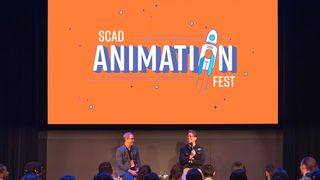
If you need the best VFX career advice you need to go to those who have done it all. Sitting across from me is Brian Kubovcik, head of studio and senior VFX supervisor for FuseFX in Atlanta. His CV reads like a greatest hits list of the hottest TV shows and streaming movies in recent years, from Succession to She-Hulk and, my personal favourite, No One Will Save You. Who better to get some career advice from?
"Speaking from personal experience, it's always about coming as a team player, that's the biggest thing," he tells me. Kubovcik is quietly spoken and precise in his wording. He takes a moment to think, before saying, "And understanding," by which he explains newcomers to the VFX industry can get disheartened by critiques and the constant need to make changes.
Kubovcik expands on why understanding of decisions is vital: "I think the thing that can discourage people on the way up as an artist, in VFX especially, is the notes receiving process and understanding that it's not personal and that we're trying to get to an end mark, a goal, a finish line, and that all of those notes are geared from a very specific perspective."
It's interesting that Kubovcik's first piece of advice is not about the software, the tools of the trade, he's not offering advice on how to get started in Blender or granular tips in Houdini. The soft skills of team work are where you'll get ahead, according to Kubovcik.

A bit of context; I'm sitting with Kubovcik in a classroom at leading US art college SCAD - Savannah College of Art and Design - during the SCAD Animation Festival. Kubovcik is here to discuss his career but more importantly encourage more artists to move to Georgia for work; the city of Atlanta is a huge attraction for the film and TV industry, with more projects filmed in Georgia than any other place in the world. In fact, Kubovcik turned the Atlanta skyline into New York for HBO's dystopian miniseries DMZ.
Kubovcik says graduates from places such as SCAD, and those who are new to the VFX industry, need to understand how the structure of production and post-production works, and that criticism, especially on larger productions, is "all for a reason".
He explains: "It's just like when an artist is working out an idea for themselves, it's not right the first time when you're just doing a personal project. It's iterations. It's iterations to find what makes sense for your creative vision. I think when you get into a show and you're an artist and you're making your way through, you're doing so many shots at a different time, especially within the framework of a company, that it's hard to remember that it's working towards a goal of creating a world that has realism."
Get the Creative Bloq Newsletter
Daily design news, reviews, how-tos and more, as picked by the editors.
Hard times in VFX
The VFX industry is having a hard time right now, and in fact, if you're entering the profession for personal plaudits it's perhaps not the ideal place. It can be hard work with long hours and you won't always get credit for the work you're doing, at least from outside your studio and team.
"It's hurtful to know that when it comes to award shows that the VFX category is either just cut out or, in the case of certain shows, that it becomes a joke," Kubovcik says, before offering hope. "Those things hurt, and I think that people get discouraged by it, but I think at the end of the day, you have a really generous and giving group, a community of artists who've joined the VFX industry, and who continue to join VFX industry, that realise being able to get to tell stories, even in our own little ways, is really rewarding."
As I speak with Kubovcik about the state of the VFX industry it's clear how much he simply loves this work. He grew up on a strict diet of Star Wars and Ghostbusters; Kubovcik's eyes light up as he explains how he'll often go back and rewatch YouTube videos by those movies' VFX supervisors to pick up advice and learn a new way of doing something.
Kubovcik eloquently puts into context the role of a VFX artist by explaining the job is to love "creating what they want to create" but ultimately "that's the vision of the director". His advice is to grapple with this dynamic, the need to put your artistic story onto a director's vision, and understand "each thing is its own beast and try to bring every bit of talent you can to figure out how do you fit into a project; it can be as a supervisor all the way down to an artist but you must try to come up with ideas or methodologies that work well for that show".
Find that next thing to make you uncomfortable, and get comfortable with being uncomfortable.
Brian Kubovcik, head of studio, FuseFX
It's here we stray from the usual advice you may read about how to get started in the VFX industry and focus on how to get on in the VFX industry. Everyone, no matter your position, needs to learn how to take that next step on the career ladder. For Kubovcik it happened some years into his career, he'd worked across the Mid-Atlantic, the Southeast and in New York City, but wanted something else, something different.
"I think that's the most precarious one," he says honestly when I ask what advice he has for experienced VFX artists looking for a career change. "I think, for me personally, when I was at that point, it was to jump into something completely new, to have a kind of shock to the system."
Kubovcik tells me how he went from being a specialist Flame artist working on commercials and music videos, including those for Beyoncé, where he'd have clients sitting with him as he worked, to then being on set, "where the rubber meets the road".
The VFX director had become "comfortable" with his work but "detached" from the art of creating a story. Kubovcik explains: "That was something that was missing for me. That's not to say that everyone should jump in and go to set, it's just find that next thing to make you uncomfortable, and get comfortable with being uncomfortable."
Step out of your comfort zone
That last piece of advice has Kubovcik thinking; the idea of stepping out of your comfort zone is a universal tip that can be applied to any artist at any level in any discipline. For Kubovcik it's also a good way to overcome imposter syndrome and build resilience to criticism and ultimately find a new level of creativity.
"I think imposter syndrome is something that I think a lot of people have battled with, and you just have to trust your instincts to just be able to go through something," he explains, adding: "Like I said, throw yourself into a situation where you're uncomfortable. Getting comfortable with being uncomfortable and learning how to make a decision and live with it and then learning from it; that sharpens the sword."
Whether you're new to VFX or looking to make a move up or elsewhere, Kubovcik's advice will resonate. Speaking with FuseFX head of studio he's also keen to stress you needn't think a move to LA or New York is necessary, times have changed and a city like Atlanta, which offers diversity and a growing filmmaking legacy, should be considered. If you're looking for more VFX career advice read our feature on 'How to land your dream VFX job' or tips on 'How to get a job at a top VFX agency'.

Thank you for reading 5 articles this month* Join now for unlimited access
Enjoy your first month for just £1 / $1 / €1
*Read 5 free articles per month without a subscription

Join now for unlimited access
Try first month for just £1 / $1 / €1
Ian Dean is Editor, Digital Arts & 3D at Creative Bloq, and the former editor of many leading magazines. These titles included ImagineFX, 3D World and video game titles Play and Official PlayStation Magazine. Ian launched Xbox magazine X360 and edited PlayStation World. For Creative Bloq, Ian combines his experiences to bring the latest news on digital art, VFX and video games and tech, and in his spare time he doodles in Procreate, ArtRage, and Rebelle while finding time to play Xbox and PS5.
